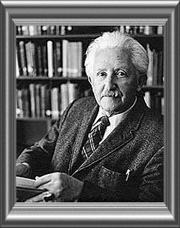|
 Erikson Erikson 
Ψ In an extension of Freud's theory, Erik Erikson proposed eight successive stages of development from infancy through old age, each stage involving a crisis that must be solved.

|

|
1. Trust versus Mistrust (infant 0-1) - Hope is the virtue that develops upon successful resolution of this stage. else wise: withdrawal may occur. Unresolved: suspicious of others,
making close relationships difficult.
2. Autonomy versus Shame & Doubt (toddler 2-3) - Will / compulsion
Unresolved: Obsessively driven, single-minded, not socially responsive.
3. Initiative versus Guilt (preschooler 3-6) - Purpose / inhibition
Unresolved: fearful, regretful.
4. Industry versus Inferiority (school age 7-12) - Competence / inertia
Unresolved: self critical of any endeavor,
procrastinating, perfectionistic.
5. Identity versus Role Confusion (adolescence, 12- 20) - Fidelity / repudiation
Unresolved: uncertain & negative about values, lifestyle, friendships.
6. Intimacy versus Isolation (early adulthood, 20 - 40) - Love / exclusivity
Unresolved: anxious about closer relationships, jealous, lonely.
7. Generativity versus Stagnation (middle adulthood, 40 - 65) - Care / reflectivity
Unresolved: fear of failure.
8. Integrity versus Despair (late adulthood, 65 +) - Wisdom / distain
Unresolved: no life plan, lack of awareness of personal responsibilities.
Ψ Ethnic identity
• is reciprocal, both a personal choice & a response to others.
• depends on context & therefore changes with time & circumstances.
• is multifaceted: emerging adults choose some attributes & reject others.
Ψ Vocational Identity
• Traditional vocational identity may be an illusion in the current employment market. Many young adults see work as a way to earn money while
they satisfy their creative, self-expressive impulses elsewhere.
Growth & Development
Robert C. Gates

|
Grown-up
by Edna St. Vincent Millay
Was it for this I uttered prayers,
And sobbed and cursed and kicked the stairs,
That now, domestic as a plate,
I should retire at half-past eight?
|
|












